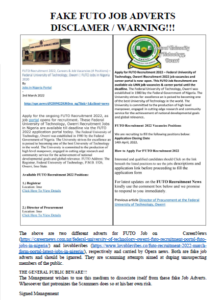Programmes, of course, leading to the award of Bachelor’s degree shall be provided in each school and department.
Instructions are by the course unit system. A course unit is defined as a series of fifty-one-hour lectures or a series of forty-five-hour laboratory work, or any equivalent workload offered over one semester of about fifteen weeks.
The following terms shall apply in evaluation
Grade Point (GP): the grade derived from the actual percentage or raw score for a course: the raw score is converted into a letter grade from A to F and a grade point ranging from 5 to 0 as shown in section 21.
Total Grade Point (TGP): this is derived from multiplying the grade points by the units per course and summing up to the grade for all the courses registered.
Total Number of Units (TNU): this is obtained by adding up all the units taken by the student in the semester.
Grade Point Average (GPA): performance in any semester is reported as a grade point average. The GPA is the average of weighted grade points earned in the course taken during the semester. The GPA is obtained by dividing the TGP by the TNU.
Cumulative Grade Point Average (CGPA): this is the up to date average of the grade points earned by the students in a programme of study. It is an indication of the students’ overall performance at any point In the programme. To compute the CGPA, the TGP’s for all the semesters are added, then divided by the TNU’s for all courses registered by the student.
There shall be five levels of undergraduate courses coded as follows:
- 1st Year 101 – 199
- 2nd Year 201 – 299
- 3rd Year 301 – 399
- 4th Year 401 – 499
- 5th Year 501 – 599
As a rule, Harmattan Semester course codes end in odd numbers while Rain semester course codes end in even numbers.
A student shall normally be required to register for and take a minimum of 15 Units and a maximum of 24 Units during each semester. However, in exceptional cases, three additional units above the present maximum of 24 units may be approved as follows:
A student with CGPA of not less than 3.00 may register up to a maximum of 27 Units per semester on the approval of the school board of studies. Such approval shall be processed to the senate for ratification.
A 400 level student may register up a maximum of 27 units during the Harmattan semesters on the approval of the senate.
A graduating student may register up to a maximum of 30 units per semester on the approval of the senate.
Appropriate pre-requisite and/or concurrent course may be waived for suitably qualified candidates only by the Senate on the recommendation of the appropriate school board of the student(s).
Each course shall be examined at the end of the semester in which the course is completed. Any deferment shall be by the approval of the Senate on the recommendation of the school board of the student concerned. At the end of each course, a candidate shall be credited with the number of units assigned for each course taken and passed.
DURATION OF THE DEGREE PROGRAMME
Unless otherwise permitted by the senate, a student shall complete a Bachelor’s degree programme in not less than ten semesters and not more than fourteen semesters, from the date of first registration in the university. Any period of authorized withdrawal shall not be included. These provisions shall not apply to transfer students from other universities or to students admitted by direct entry.
A degree certificate shall bear the date on which the senate approved that the student has fulfilled the university’s requirements for the award of the degree.
A transfer student with advanced standing shall be required to spend not less than three academic sessions (6 semesters) in the university to be eligible for a degree. The courses required for the graduation of such a transfer student shall be duly approved by the Senate on the recommendation of the appropriate school board of studies.
ELIGIBILITY
No student shall be eligible for semester examination unless he has fulfilled the conditions laid down by the university.
No final year student shall be given his degree certificate or statement of result for transcript unless the registrar certifies that the candidate is not indebted to the university in any way.
Permission to appear at the university examination may be withdrawn at any stage by the senate for ratification.
EXAMINATION FREQUENCY
The formal examination shall normally be held at the end of each semester. Resit examinations are not held.
EXAMINATION TIME-TABLE
All lectures shall end at least three days before the first day of the semester examination.
For all semester examinations, a student shall as far as practicable not be required to take more than two papers within a period of 24hours.
The committee shall provide an examination time-table for all university common courses (UCC) and circulate to all schools and student notice boards. The Dean of each school shall produce the examination time-table for courses offered in his school in harmony with the time-table for UCC.
Examinations shall be spread fairly evenly between morning and afternoon sessions so that the most economical use may be made of available accommodations


